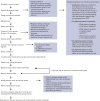Health following recovery from immune thrombotic thrombocytopenic purpura: the patient's perspective
- PMID: 36287218
- PMCID: PMC10164827
- DOI: 10.1182/bloodadvances.2022008342
Health following recovery from immune thrombotic thrombocytopenic purpura: the patient's perspective
Abstract
The impact of residual symptoms following recovery from immune-mediated thrombotic thrombocytopenic purpura (iTTP) on activities of daily living during remission is not routinely discussed or evaluated by hematologists. This study used qualitative methodology to understand 3 issues from the patient's perspective: the most important symptoms during remission, the impact of these symptoms on their daily activities, and the effectiveness of communication with hematologists. Oklahoma and Ohio patients participated in either focus groups or individual interviews. Eligibility included age ≥18 years, ADAMTS13 deficiency (<10% activity) at diagnosis or relapse, and in clinical remission (≥1 year from episode). A nonprobabilistic purposive sampling approach was used. The most important symptoms were defined as symptoms mentioned across all 7 focus groups. The interviews supplemented focus group data. The analysis focused on describing the impact of symptoms and barriers to communicating with hematologists. A total of 44 patients participated (focus groups, N = 25; interviews, N = 19). The most important symptoms affecting the patients' daily activities were cognitive issues, anxiety, depression, and fatigue. These symptoms affected patients' ability to return to their previous level of functioning and created difficulties in relationships. A key communication barrier with their hematologists was forgetting to mention these symptoms. Although hematologists pronounce patients as recovered, iTTP remains a life-changing event. Patients often did not return to their previous functioning; relationships and careers were affected. However, patients may forget to discuss these concerns with their hematologist. To improve remission care, hematologists should incorporate patient-reported outcome measures evaluating these symptoms in remission visits.
Licensed under Creative Commons Attribution-NonCommercial-NoDerivatives 4.0 International (CC BY-NC-ND 4.0), permitting only noncommercial, nonderivative use with attribution.
Conflict of interest statement
Conflict-of-interest disclosure: The authors declare no competing financial interests.
Figures
References
-
- Joly BS, Coppo P, Veyradier A. Thrombotic thrombocytopenic purpura. Blood. 2017;129(21):2836–2846. - PubMed
-
- Dutt T, Shaw RJ, Stubbs M, et al. Real-world experience with caplacizumab in the management of acute TTP. Blood. 2021;137(13):1731–1740. - PubMed
-
- Cuker A, Cataland SR, Coppo P, et al. Redefining outcomes in immune TTP: an international working group consensus report. Blood. 2021;137(14):1855–1861. - PubMed
Publication types
MeSH terms
Grants and funding
LinkOut - more resources
Full Text Sources
Medical





